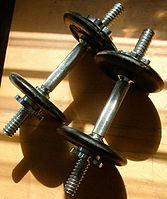
Photo from wikipedia
Background Juvenile idiopathic arthritis (JIA) is the most prevalent rheumatic disease in children. The core stability exercises ensure proper muscular strength and balance around the lumbo-pelvic-hip complex . Objective This… Click to show full abstract
Background Juvenile idiopathic arthritis (JIA) is the most prevalent rheumatic disease in children. The core stability exercises ensure proper muscular strength and balance around the lumbo-pelvic-hip complex . Objective This study evaluated whether the use of core stability exercises would increase the effectiveness of conventional physical therapy (PT) in enhancing bone mineralization and improving functional capacity in children with polyarticular JIA. Methods Thirty-three children with polyarticular JIA (age; 10–14 years) assigned randomly into two groups: the control group ( n = 16) received the conventional PT, and the study group ( n = 17) received the core stability exercises in addition to the same conventional PT program. Both core stability and conventional PT exercises continued for 3 months. The measures of bone mineralization and functional ability were investigated by dual-energy X-ray absorptiometry (DXA) device and 6-min walk test (6MWT), respectively, at baseline and immediately post-treatment. Results Analysis of covariance (ANCOVA) revealed significant differences between groups in favor of the study group regarding measures of bone mineralization of lumbar spine and femoral neck regions as P < 0.05, except for volumetric bone mineral density of lumbar spine the P > 0.05. There was a significant difference between the two groups concerning functional capacity measured in 6MWT ( P < 0.05), where children in the study group walked 531.71 ± 90.59 m compared with the control group 509.31 ± 73.10 m. Conclusion Core stability exercises are an effective adjunctive therapy to enhance bone health status and improve functional capacity in children with polyarticular JIA. Key Points • In addition to conventional physical therapy, core stability exercises had a definite effect on improving bone health status and quality of life in children with polyarticular juvenile idiopathic arthritis. • Improved bone mineralization and functional capacity due to core stability exercises contain two parts: strengthening training and controlling equilibrium.
Journal Title: Clinical Rheumatology
Year Published: 2020
Link to full text (if available)
Share on Social Media: Sign Up to like & get
recommendations!